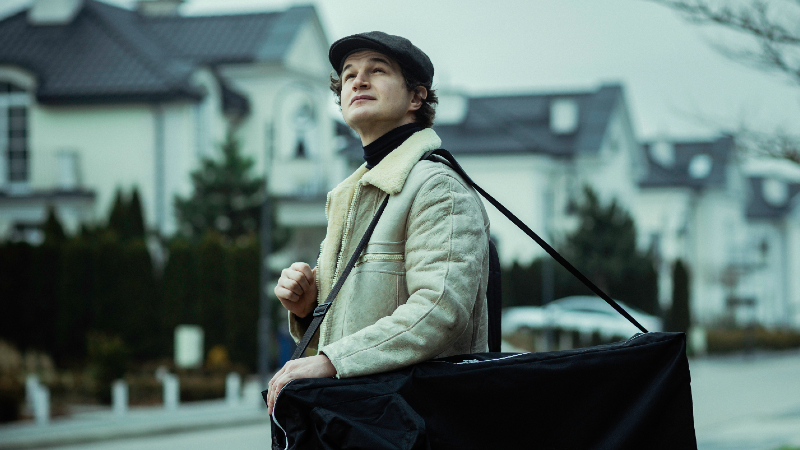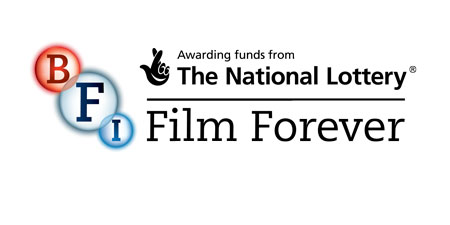Visions of Europe: Never Gonna Snow Again LUMI Review
13 April 2022
After its screening at QFT as part of the Visions of Europe season, LUMI young programmer Fionntán Macdonald reviews Never Gonna Snow Again.

Devotees to the cinema of the surreal will have a lot to gain from watching Never Gonna Snow
Again (2020), the metaphysical and mysterious movie by the Polish filmmaking duo Malgorzata Szumowska and Michal Englert. Uncanny and alienating but undoubtedly alluring, Szumowska and Englert’s dark comedy-drama focuses on the affluent but obtuse residents of a gated community in Poland who become enchanted by a mysterious immigrant from the East: the enigmatic and engrossing Zhenia (Alec Utgoff).
Szumowska has spoken previously about how the filmmakers, entirely unafraid of courting politics in their native country, constructed this film as something of a critique of Polish society. The bourgeois elite of the film’s primary setting present a facade which quickly falls away under scrutiny when Zhenia’s presence either challenges their pretensions or illuminates their real motivations. Zhenia is accepted by them and even lauded for his inexplicable gifts, yet at times they allow their prejudice against his Ukrainian roots to slip into the conversation. Szumowska has noted previously that Ukrainians are the largest immigrant group in Poland and exist as something of a lower class, almost a servant caste, who are accepted only because they more closely resemble the largely white populace and offer a service to the affluent. In short Zhenia is accepted not with open arms, but on the condition of utility.
This shallow selfishness underscores many of his interactions and soon an uncanny feeling seeps in, with a surrealism that is at times unnerving and at others discordantly comedic. There’s a strange disparity at times between context and content, such as when a cancer patient’s wife lights up a cigarette or a particularly precocious child calls her mother a slut (which was, admittedly, hilarious).
This community has a manufactured quality, a fabricated, whitewashed feel, and while his own residence is presented with a brown palette and feels distinctly lived in, wallpaper peeling and furniture threadbare, the white walled residences are composed like identical show rooms. In this way Never Gonna Snow Again feels a lot like the atmospheric cinema of David Lynch and Ari Aster: film’s that prioritise curious and offbeat world building through aesthetics and ambience.
Some truly exceptional sound design does a lot to establish this uncomfortable atmosphere early on, with industrial drones fading into the subtle but incessant ticking of the clock as the enigmatic central figure is introduced. Because of the excellent sound design each small gesture and movement is imbued with a distinct weight and gravity, from the dull cracking of a back to the distinct clinking of a necklace, each minuscule movement feels significant as a result. There’s an intentionality in the craft here, and shades of Tarkovsky in some of the slow tracking shots and particularly in the reveal of Zhenia’s abilities.
Zhenia himself serves as an anchor for the audience in this hypnagogic, magic realist world despite being the prime mover of the film's fantasy elements. This is due, in no small part, to the captivating performance of Alec Utgoff. Perhaps best known for a short lived stint on Netflix’s Stranger Things, Utgoff appears to have depths of untapped talent and enthrals from his first moments on screen through several enamouring moments that truly humanise the modern mystic. It is little wonder that the women of the community seem infatuated and even fascinated with him, while the men are somewhat relegated by his presence; distracted, emotionally absent or ill. Despite his unmistakable otherness, Zhenia does not appear to be a force of malice: in fact, compared to the petty and gossip hungry residents of the community he is practically benevolent.
His history is intentionally obscure and his motives ambiguous yet Utgoff’s enrapturing performance will likely hypnotise an audience as well as his character does, however the slow pacing and plot (or lack thereof) may divide them. This is a particular kind of film that has a lot to say but says it ambiguously. Character motivations can be vague, the plot is somewhat obscure and the point of it all is something nebulous and frustratingly intangible to some. Yet to others that will be the entire charm of this puzzling and engrossing sojourn into Polish cinema that exists to ask questions of its audience; questions that it will refuse to answer but are worth asking all the same.
- written by LUMI programmer Fionntán Macdonald




